Everybody agrees with the fact that Rex Allen was the last of the Singing Cowboys ; indeed, he entered the movies in 1949, when Republic Pictures in Hollywood signed him to a 7-year contract - with a little help from one of Rex's heroes, Roy Rogers himself (the man who used to ride Trigger). Rex starred in 19 westerns for them between 1949 ('The Arizona Cowboy') and 1954 ('The Phantom Stallion').
Rex was born
on December 31, 1921, on a ranch in Mud Springs Canyon, some forty miles from Wilcox,
in Southeastern Arizona. In the February '56 issue of 'Country'n'Western Jamboree', Bea Terry wrote : 'Rex Allen doesn't just happen to be an acting cowboy. He just happens to be a real cowboy who can act, and does'. She explains that Rex, his brother Wayne and their parents lived many miles from their nearest neighbor and that it was a quarter-mile to the spring from which they carried water. Rex lost his brother at
a very early age after he had been bitten by a rattler and his mother died of blood poisoning when he was twelve. 'By that time' writes Bea Terry, 'Rex could rope calves, had calluses from balancing on fences near chutes at rodeos, could ride a bronc bareback, could strike a match at twenty paces with a .22 calibre bullet and, in general, was a cowboy'. His father, one of the original Arizona homesteaders, was
a fiddle player and one of his cousins, a guy known as Cactus Mack, plunked a guitar ; Rex's interest in music came from there and grew even more
after his Dad bought him a guitar and a book of instructions from a Sears Roebuck catalog when he was 11. Rex's first singing was done in church choirs. According to an article in the November 1953 issue of 'Hoedown', Rex was soon playing clubs and benefits throughout the surrounding territory, and after high school graduation, joined the rodeo circuit and won considerable national acclaim. On October 10th and 18th, 1953, Rex appeared in Chicago for the World's Champion Rodeo.
More biographical data appeared in the first issue of 'The Scrapbook Of Hillbilly & Western Stars' from 1950, compiled and edited by Thurston Moore in Cincinnati, Ohio, reproduced hereafter :
Rex got his first taste of radio work in 1941. At that time he was a rider with a traveling rodeo in the east, when, as he tells it...'The rodeo broke up and I got hungry. So I got a job singing cowboy songs on a small New Jersey radio station'. Two years later, Rex joined WLS in Chicago where he won fame as 'The Arizona Cowboy' on the National Barn Dance program. His fan mail ran about 15,000 letters a year and his radio fan club of 1,500 members is fifth among such clubs in the country.
Rex Allen has written and published 250 songs, many of which have been recorded by himself and other leading artists. Some of his best known songs on the Mercury label have been 'Foggy River', 'Loaded Pistol', 'Hawaiian Cowboy', 'Teardrops In My Heart' and 'Who Shot The Hole In My Sombrero'. His recording of 'Arizona Waltz' has also been hitting the strides of popularity, and was featured in his first Republic picture, 'The Arizona Cowboy'. Rex left Chicago for Hollywood earlier this year, and right with him are his wife, Bonnie, and their two year old son, Chico. Rex signed a contract with Republic Pictures calling for four filmings this year and at least six during 1950. We know his many thousands of fans throughout the nation are real happy about seeing their idol on the screen. For recordings Rex uses an aggregation of top musicians known as 'the Arizona Wranglers'. His recent recordings were made with Jerry Byrd who is one of the most famous steel guitar stylists in the business.
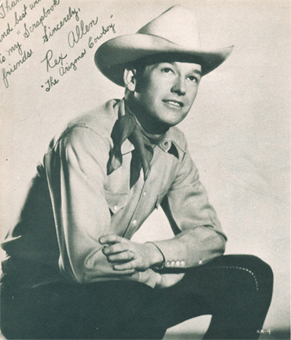 Indeed, Rex did some radio work in Phoenix,
Arizona, and held many jobs before winding up in Trenton, New-Jersey, as a featured singer over WTTM. He then joined a group of country singers, The Sleepy Hollow Gang, who managed to get a job on Chicago's famous 'National Barn Dance' in 1944.
Indeed, Rex did some radio work in Phoenix,
Arizona, and held many jobs before winding up in Trenton, New-Jersey, as a featured singer over WTTM. He then joined a group of country singers, The Sleepy Hollow Gang, who managed to get a job on Chicago's famous 'National Barn Dance' in 1944.
Like Gene Autry and Red Foley before him, Allen's job at WLS provided the big break he was dreaming of. He stayed there until 1949. By 1950, he had his own very successful radio show on CBS.
Meantime, Rex had accepted an offer from Republic Pictures in 1948. According to Bea Terry's article from 1956, he made twenty-three pictures for them before extending his activity to television.
In 1945, he signed
a recording contract with Mercury Records ; he cut about forty discs for them
- some being pretty dire pop (like his duets with Patti Page in 1950-1), most of the others
showing his deep,
melodious baritone voice to good advantage like the excellent 'You Started Honky Tonkin' (#6008, 1946), 'Blues In My Mind ' (#6221, 1949) and 'Dixie Boogie' (#6252, 1950). Of course, he could yodel too, as demonstrated with 'Yodelin' Crazy' (#6269). He found himself in good company at Mercury with Tiny Hill, Jenny Lou Carson, Cliff Bruner, Lonnie Glosson, Carl Story, Doye O'Dell, Eddie Dean, Flatt & Scruggs, Red Kirk or Buz Butler among so many others. At first, the '78s bore the mention
'Rex Allen & His Dawn-Busters', then 'Rex Allen & His Dawn-Breakers'
and eventually, 'Rex Allen & His Arizona Wranglers'.
In 1949, Rex sang the vocal part on Jerry
Byrd's classic, 'Steelin' The Blues' (Mercury 6175); he would also sing on both sides of another Jerry Byrd single in 1950 ('Bandera Waltz' c/w 'Steelin' Is His Business', Mercury 6232). In return, Byrd would often play steel guitar on
Allen's recordings from then on.
1952 saw Rex moving to Decca Records - that's
where he cut his best sides. He went back to straight Country music for a
while, cutting nice versions of 'Jambalaya' and Stuart Hamblen's 'Rack Up
The Balls Boys' ; other good songs included 'Till The Well Goes Dry', 'Lonesome
Letter Blues', 'Money, Marbles & Chalk' and 'This Old House', a duet with
Tex Williams. His biggest hit though, was his 1953 cover of Darrell Glenn's
'Crying In the Chapel' (Valley 105), later a huge success for Elvis Presley.
In the April 1954 issue of 'Hoedown', it was reported that Rex had a very active fan club run by Mrs Wilma Orr and that he cooperated completely with his club, giving away valuable personal gifts for contests the club sponsored and treating its members wonderfully - a real gentleman.
Musically speaking, two singles stand out in my humble opinion.
One
is from 1952 (Decca #28446) and couples a languorous, organ-backed version of 'No One Will
Ever Know' (featuring Jerry Byrd on steel once more) with a terrific hillbilly boogie number, 'Hootin' & Howlin',
written by Vaughn Horton who also penned or co-penned such classics as 'Choo
Choo Ch'Boogie', 'Mockin' Bird Hill', 'Sugarfoot Rag', 'Plantation Boogie'
and 'Hillbilly Fever'. Allen had cut other boogies prior to that one (i. e.
'Dixie Boogie' and 'Honolulu Boogie', both on Mercury) but I think 'Hootin'
& Howlin', propelled by some Jerry Adler-type harmonica, is one of his best.
The harmonica solo is wonderful and there's also a very fine guitar break.
Rex's voice - one of the best in its category, just a notch below Eddie
Dean's - is perfectly suited to that uptempo material.
The other (Decca #30651) was the result of a February 23, 1958, session held
at Bradley's Studio in Nashville. This time, Rex tried to rock - certainly
with some reluctance - but he did score nicely thanks to two Clyde Mitchell
compositions. 'Knock, Knock, Rattle' is a real good rocker, fast and ornamented
with two strong Hank Garland guitar soli. Rex manages to mention 'Rin-Tin-Tin'
in the words - probably a nod to his friend, James L. Brown. The song re-emerged
on the third volume in the trailblazing 'Rare Rockabilly' series of UK LPs
in 1978 - the definitive proof of its enduring quality. As for the flip side,
'Invitation To The Blues', it's more relaxed and the vocal chorus more prominent
but Garland again is in fine form, playing licks which would soon grace Elvis's
records such as 'I Need Your Love Tonight'. One mystery I'd like to solve concerns the composer credits to 'Invitation
To The Blues' ; that same song was later cut by Roger Miller, Red Sovine, Pete Drake and Joe Maphis,
yet the credits always go to Roger Miller. Did Clyde Mitchell sell his rights ?
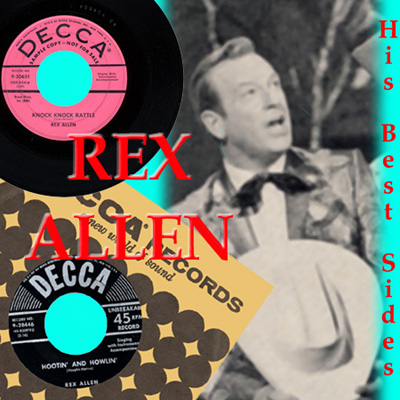 Even
if 'Knock, Knock, Rattle' didn't dent the charts, Allen's discs sold usually
well and at the end of the '50s, Rex was living comfortably in California.
One day, he got a call from Walt Disney who asked him to become the narrator
on some of his nature movies and do some cartoon character voices as well
; according to Rex himself, he worked in 150 such movies in about 15 years.
The association with Disney Productions led to Allen's appearance on Disney's
Buena Vista label - home of Annette and Hayley Mills ! Happily, it didn't
last ; Allen went on to record for Hacienda (he had 3 singles, one EP and
one LP there, featuring a remake of 'Lonesome Letter Blues'), then returned
to Mercury where he enjoyed a big hit with 'Don't Go Near The Indians' in
1962.
Even
if 'Knock, Knock, Rattle' didn't dent the charts, Allen's discs sold usually
well and at the end of the '50s, Rex was living comfortably in California.
One day, he got a call from Walt Disney who asked him to become the narrator
on some of his nature movies and do some cartoon character voices as well
; according to Rex himself, he worked in 150 such movies in about 15 years.
The association with Disney Productions led to Allen's appearance on Disney's
Buena Vista label - home of Annette and Hayley Mills ! Happily, it didn't
last ; Allen went on to record for Hacienda (he had 3 singles, one EP and
one LP there, featuring a remake of 'Lonesome Letter Blues'), then returned
to Mercury where he enjoyed a big hit with 'Don't Go Near The Indians' in
1962.
He wrote the last chapter of his recording career at Decca in the late '60s,
while keeping on raising horses on his ranch and performing on the rodeo circuit
: yes indeed, a true Cowboy !
He had married Bonnie Linder, a Nebraska native whom he met while making a Chicago radio appearance. They had three sons : Rex Jr. (born in 1948), Curtis (born in 1951) and Mark Wayne (born in 1954). Surely one of his biggest prides has been to watch his first
son, Rex Allen Jr., become a successful Country singer in the '70s.
In 1999, the Chicago-based Bloodshot label put out a Rex Allen CD titled 'The Last Of
The Great Singing Cowboys' (SCD 4101), comprised of previously unreleased radio transcription recordings dating from 1946-49 (the WLS Barn Dance period), which received a glowing review from Ron Bally in issue #137 of Discoveries. The 22 live, in-studio cuts, originally cut directly to acetates, present Allen backed by The Prairie Ramblers on songs like 'Little Puncher', 'Mexicali Rose', 'Rocky Mountain Home', 'Dude Ranch Polka' and 'I Won't Need My Six-Gun In Heaven'. There's even a song sung by Bonnie Linder called 'Gonna Mary Me A Cowboy' - which she obviously did by becoming Rex's wife.
[Further reading includes a very informative piece published in the April '83 issue of US
mag, 'Goldmine', by author Bob Garbutt.]
Herewith a selected MERCURY & DECCA discography, focussing on Rex Allen's 40's & 50's recordings. |
|
| MERCURY | |
6008 |
352 Atomic Power 351 You Started Honky Tonkin' |
6015 |
501 Don't Turn Your Back On Me (Gibson-Allen) 500 Texas Tornado (Wakely) |
6017 |
499 Driftwood On The River (Klenner-Miller) 502 Look At Me Now (Bonnie Allen) |
6034 |
726 Foggy River 727 A Broken Promise Means A Broken Heart |
6036 |
180 Curtains Of Sorrow 179 Whatcha' Gonna Do |
6049 |
882 Feudin' And Fightin' (Dubin-Lane) 879 Take It Back And Change It For A Boy (Chattaway) |
6060 |
1506 Lord Protect My Darlin' 1510 The Border Serenade |
6061 |
353 Queen Of The Rodeo 880 I Went And Got A Bucket For My Tears |
6078 |
1382 That Little Boy Of Mine 1388 Loaded Pistol |
6091 |
1387 Hawaiian Cowboy (Allen-Johnson) 879 Take It Back And Change It For A Boy (Chattaway) |
6095 |
1385 Slap Her Down Again, Paw 1249 Tear Drops In My Heart |
6122 |
1383 Chime Bells 1389 Miranda Doaks |
6140 |
1384 Who Shot That Hole In My Sombrero (Leeds-Hayes) 1636 Happy Mary Polka |
6171 |
2347 Tennessee Tears 2349 Song Of The Hills |
6192 |
1631 Cottage In The Clouds 2346 Afraid |
6203 |
2348 Arizona Waltz (Allen) from the Republic Picture, 'The Arizona Cowboy' 1509 Tell Me Little Darlin' (Hurt-Taylor) |
6214 |
178 I'm So Alone With The Crowd 2616 Over Three Hills |
6221 |
2615 Little Brown Shoes (Greishop-King) 2617 Blues In My Mind (Fred Rose) |
6228 |
2673 I Gotta Have My Baby Back 2680 A Petal From A Faded Rose |
6231 |
2676 Broken Down Merry-Go-Round (Herbert-Spryker) with Patti Page 2677 Tag Along (Shelb-King-Pendlton) |
6252 |
7002 Dixie Boogie 7508 Put Your Arms Around Me |
6258 |
2678 Softly And Tenderly (Thompson) with Patti Page 2679 Farther Along (Shelb-King-Pendlton) |
6269 |
1503 Don't Cha 1633 Yodelin' Crazy |
6286 |
7043 Honolulu Boogie (Spencer-Spencer) 7045 Too-LeeRollum (Allen) |
6297 |
7042 You Drifted 7044 I Ain't Gonna Cry No More |
6349 |
881 Naggin' (Allen-Penny) 1637 Albuqerque Polka (Bohme-Allen) |
EP-1-3111 |
No More-Cattle Call-Just Walking Out The Door-Sentimental Fool |
EP-1-3113 |
Ten More Miles To Go-Hot Time In New-Orleans Tonight-Afraid-Light In The Window |
EP-1-3209 |
Loaded Pistol-Mister & Mississippi-I Gotta Have My Baby Back-Don't Turn Your Back On Me |
More useful information can be found in the Hillbilly Researcher publication, 'Mercury - 6000 Hillbilly Series', compiled by Big Al Turner and Dave Sax. |
|
| DECCA | |
46390 |
81822 I've
Got So Many Million Years (Stuart Hamblen) Is He satisfied ? |
27876 |
81804 Tuck
Me To Sleep In My Old Tucky Home (Young-Lewis-Meyer) 81803 Ragtime Melody (Beasley-Hazlewood-Stratton) with The Nashville Dixielanders |
27952 |
81823 As
Long As The River Flows On (Art Noel-A. Leroyal) 81806 Waltz Of Roses (Tim Spencer-Glenn Spencer) |
28146 |
Till
The Well Goes Dry Rack Up The Balls Boys |
28341 |
83087 Two
Faced Clock (Ruth Beifield-Harold Saxe) with The Nashville Dixielanders 83088 Jambalaya (On The Bayou) (Hank Williams) |
28446 |
83091 Hootin' & Howlin' (Vaughn Horton) 83089 No One Will Ever Know (Mel Foree-Fred Rose) |
28556 |
83090 Knockin'
On The Door (Autry Inman) 83092 Why, My Darlin' Why (Rex Allen) |
28758 |
84672 Crying
In The Chapel (Artie Glenn) 81826 I Thank The Lord (R. Allen-D.Bohne) |
28897 |
85253 To
Be Alone (Billy Vaughn) 85254 If God Can Forgive You, So Can I (Charlie Gore-Buford Abner) |
28933 |
Why
Daddy Where Did My Snowman Go |
28998 |
He
Played The Steel Guitar Somewhere |
29111 |
84670 Bringing
Home The Bacon (Frank Bannister-Lew Colwell-Gus Van-Joe Schenck) 85304 I Could Cry My Heart Out (Sometimes) (Floyd Wilson) |
29168 |
L 7635 Chapel
Of Memories L 7636 In The Chapel In The Moonlight (Billy Hill) |
29254 |
L 7780 This
Old House (Stuart Hamblen) as by Rex Allen & Tex Williams L 7782 Two Texas Boys (Don Raye-Sonny Burke) as by Tex Williams & Rex Allen |
29297 |
You
Took My Name I'm Learning To Live Without You |
29397 |
84516 L-o-n-e-s-o-m-e
Letter Blues (Cindy Walker) L 7785 Tomorrow's Just Another Day To Cry (Billy Hayes-Rosalie Allen) |
29586 |
That's
What Makes The Juke Box Play Pedro Gonzales Tennessee Lopez |
29610 |
L 8518 Daddy
You Know What (Jim Wilson) 88108 The Albino (Pink Eyed) Stallion (Marvin Rainwater) |
29729 |
L 8767 The
Last Round-Up (Billy Hill) L8768 I'm A Young Cowboy (Rex allen-Dave Woody) |
29871 |
The
Last Frontier Sky Boss |
30066 |
L 9237 Nothin'
To Do (Johnny Parker) L 9236 Trail Of The Lonesome Pine (Harry Carroll-Ballard McDonald) |
30204 |
Durango Little White Horse |
30205 |
L 9630 Westward
Ho The Wagons ! (George Bruns-Tom Blackburn) L 9628 Wringle Wrangle (Stan Jones) |
30364 |
L 10175 Flower
Of San Antone (Ray Joseph-Mack David) 102334 Money, Marbles & Chalk (Pop Eckler) |
30511 |
101085 Blue
Dream (Felice & Boudleaux Bryant) with Nudie on mandolin 102337 The Blue Light Waltz (Al Hoffman-Dick Manning) |
30651 |
104624 Knock, Knock, Rattle (Clyde Mitchell) 104628 Invitation To The Blues (Clyde Mitchell) |
30833 |
85309 I
Know The Reason Why (Pee Wee King-Redd Stewart) 85307 The Mystery Of His Way (Bob Nolan) |
31039 |
Take
Me Lord Sheltered In The Arms Of The Old Rugged Cross |
32322 |
Tiny
Bubbles Jose Ville Lobo Alfredo Thomoso Vincente Lopez |
ED-2448 |
'WESTWARD
HO THE WAGONS' (4-song EP) Wringle Wrangle-Ballad Of John Colter-I'm Lonely My Darlin'-Westward Ho The Wagons ! |
DL-8402 |
'UNDER
WESTERN SKIES' (LP issued in 1956 ; with
Victor Young & Singing Strings) |
DL7-8776 |
'MISTER
COWBOY' (LP issued in 1959) |
© PAUL VIDAL * Privas, France * 2002 - 2024


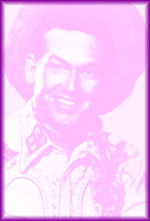
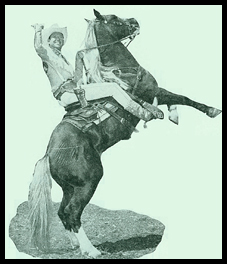 Rex & his horse, 'Koko'
Rex & his horse, 'Koko'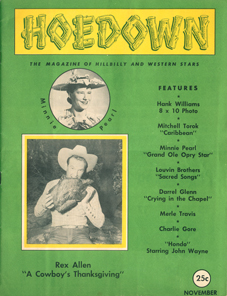
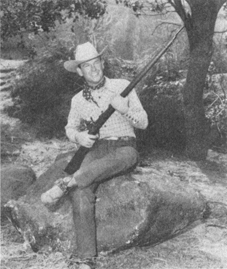
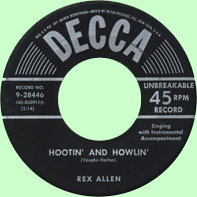
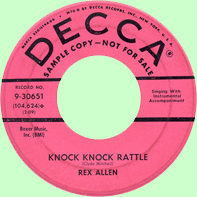
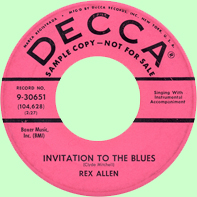
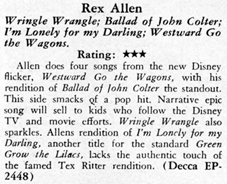 EP review in C&W Jamboree - March 1957
EP review in C&W Jamboree - March 1957 
